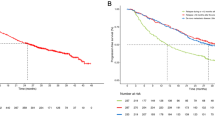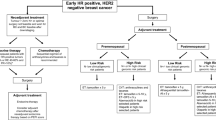Summary
There is currently no standard care for metastatic breast cancer; consequently, individual patient and tumor characteristics are among several factors considered in treatment decisions. Clinical studies continue to clarify the roles of endocrine therapy, chemotherapy, and biologic therapy, and results have been promising. For patients with hormone receptor-positive disease, several endocrine agents are currently available including selective estrogen receptor (ER) modulators (tamoxifen and toremifene), aromatase inhibitors (anastrozole, exemestane, and letrozole), as well as the selective ER down-regulator, fulvestrant. Effective first- and second-line, single-agent chemotherapeutic treatments include the taxanes, anthracyclines, vinorelbine, capecitabine, and gemcitabine. The benefits of sequential, single-agent versus combination chemotherapy are also being evaluated. Although combination chemotherapy generally results in a greater objective response, it is associated with similar survival and usually greater toxicity compared with sequential, single-agent chemotherapy. Research involving biologic therapy continues to provide encouraging results for patients with metastatic breast cancer. Chemotherapy plus trastuzumab has been shown to result in greater overall survival versus chemotherapy alone in human epidermal growth factor 2 (HER-2)-positive patients. Trastuzumab has been associated with cardiotoxicity when administered with conventional anthracyclines. Newer formulations of anthracyclines have been developed (e.g., liposomal anthracyclines) to decrease the incidence of cardiotoxicity, and these provide additional treatment options for patients with metastatic breast cancer. The potential effect of all of these endocrine, chemotherapeutic, and biologic treatments on quality of life is an important consideration. Additionally, integrating patient concerns into treatment decisions and collaborating with cross-disciplinary healthcare providers can help to manage the disease more effectively.
Similar content being viewed by others
References
National Comprehensive Cancer Network: Clinical practice guidelines in oncology: Breast cancer. Version 3: 2003
CT Chung RW Carlson (2003) ArticleTitleGoals and objectives in the management of metastatic breast cancer Oncologist 8 514–520
J Bonneterre A Buzdar JM Nabholtz JF Robertson B Thürlimann M Euler Particlevon T Sahmoud A Webster M Steinberg (2001) ArticleTitleAnastrozole is superior to tamoxifen as first-line therapy in hormone receptor positive advanced breast carcinoma: results of two randomized trials designed for combined analysis Cancer 92 2247–2258
R Paridaens L Dirix C Lohrisch L Beex M Nooij D Cameron L Biganzoli T Cufer L Duchateau A Hamilton JP Lobelle M Piccart (2003) ArticleTitleMature results of a randomized phase II multicenter study of exemestane versus tamoxifen as first-line hormone therapy for postmenopausal women with metastatic breast cancer Ann Oncol 14 1391–1398 Occurrence Handle10.1093/annonc/mdg362 Occurrence Handle1:STN:280:DC%2BD3svhsFSjsA%3D%3D Occurrence Handle12954578
H Mouridsen M Gershanovich Y Sun R Pérez-Carrión C Boni A Monnier J Apffelstaedt R Smith HP Sleeboom F Jaenicke A Pluzanska M Dank D Becquart PP Bapsy E Salminen R Snyder H Chaudri-Ross R Lang P Wyld A Bhatnagar (2003) ArticleTitlePhase III study of letrozole versus tamoxifen as first-line therapy of advanced breast cancer in postmenopausal women: analysis of survival and update of efficacy from the International Letrozole Breast Cancer Group J Clin Oncol 21 2101–2109
B Brun M Benchalal C Lebas P Piedbois M Lin JP Lebourgeois (1997) ArticleTitleResponse to second-line chemotherapy in patients with metastatic breast carcinoma previously responsive to first-line treatment: prognostic factors Cancer 79 2137–2146
Paridaens R, Therasse P, Dirix L, Beex L, Piccart M, Cameron D, Cufer T, Roozendaal K, Nooij M, Mattiacci M-R: First line hormonal treatment (HT) for metastatic breast cancer (MBC) with exemestane (E) or tamoxifen (T) in postmenopausal patients (pts) – A randomized phase III trial of the EORTC Breast Group. J Clin Oncol 22(14S): 2004 (abstract 515)
A Howell JF Robertson J Quaresma Albano A Aschermannova L Mauriac UR Kleeberg I Vergote B Erikstein A Webster C Morris (2002) ArticleTitleFulvestrant, formerly ICI 182,780, is as effective as anastrozole in postmenopausal women with advanced breast cancer progressing after prior endocrine treatment J Clin Oncol 20 3396–3403
A Howell JFR Robertson I Vergote L Mauriac UR Kleeberg J Quaresma Albano A Aschermannova (2003) ArticleTitleFulvestrant versus anastrozole for the treatment of advanced breast cancer: survival analysis from a phase III trial Proc Am Soc Clin Oncol 22 45
CK Osborne J Pippen SE Jones LM Parker M Ellis S Come SZ Gertler JT May G Burton I Dimery A Webster C Morris R Elledge A Buzdar (2002) ArticleTitleDouble-blind, randomized trial comparing the efficacy and tolerability of fulvestrant versus anastrozole in postmenopausal women with advanced breast cancer progressing on prior endocrine therapy: results of a North American trial J Clin Oncol 20 3386–3395
A Howell JF Robertson P Abram MR Lichinitser R Elledge E Bajetta T Watanabe C Morris A Webster I Dimery CK Osborne (2004) ArticleTitleComparison of fulvestrant versus tamoxifen for the treatment of advanced breast cancer in postmenopausal women previously untreated with endocrine therapy: a multinational, double-blind, randomized trial J Clin Oncol 22 1605–1613
KL Cheung JF Robertson (2002) ArticleTitleFulvestrant Expert Opin Investig Drugs 11 303–308
AD Seidman (2003) ArticleTitleMonotherapy options in the management of metastatic breast cancer Semin Oncol 30 IssueID(2 Suppl 3) 6–10
EA Perez (1998) ArticleTitlePaclitaxel in breast cancer Oncologist 3 373–389
DP Figgitt LR Wiseman (2000) ArticleTitleDocetaxel: an update of its use in advanced breast cancer Drugs 59 621–651
E Rivera (2003) ArticleTitleLiposomal anthracyclines in metastatic breast cancer: clinical update Oncologist 8 IssueID(Suppl 2) 3–9
R Paridaens L Biganzoli P Bruning JG Klijn T Gamucci S Houston R Coleman J Schachter A Vreckem ParticleVan R Sylvester A Awada J Wildiers M Piccart (2000) ArticleTitlePaclitaxel versus doxorubicin as first-line single-agent chemotherapy for metastatic breast cancer: a European Organization for Research and Treatment of Cancer Randomized Study with cross-over J Clin Oncol 18 724–733
A Michelotti M Venturini C Tibaldi C Bengala L Gallo F Carnino L Del Mastro R Lionetto E Montanaro R Rosso P Conte (2000) ArticleTitleSingle agent epirubicin as first line chemotherapy for metastatic breast cancer patients Breast Cancer Res Treat 59 133–139
M Bontenbal M Andersson J Wildiers G Cocconi J Jassem R Paridaens N Rotmensz R Sylvester HT Mouridsen JG Klijn AT Oosterom Particlevan (1998) ArticleTitleDoxorubicin vs epirubicin, report of a second-line randomized phase II/III study in advanced breast cancer. EORTC Breast Cancer Cooperative Group Br J Cancer 77 2257–2263
Blum JL, Jones SE, Buzdar AU, LoRusso PM, Kuter I, Vogel C, Osterwalder B, Burger HU, Brown CS, Griffin T: Multicenter phase II study of capecitabine in paclitaxel-refractory metastatic breast cancer. J Clin Oncol 17: 485–493, 1999
Valerio MR, Cicero G, Armata MG, Bajardi E, Crosta A, Badalamenti G, Arcara C, Agosta G, Vieni S, Latteri F, Russo A, Gulotta G, Gebbia N: Gemcitabine (G) in pretreated breast cancer (BC). In: 37th Annual Meeting of the American Society of Clinical Oncology, San Francisco, CA, USA, May 12–15, 2001 (abstract 1953)
RB Livingston GK Ellis JR Gralow MA Williams R White C McGuirt BB Adamkiewicz CA Long (1997) ArticleTitleDose-intensive vinorelbine with concurrent granulocyte colony-stimulating factor support in paclitaxel-refractory metastatic breast cancer J Clin Oncol 15 1395–1400
V Valero SE Jones DD Von Hoff DJ Booser RG Mennel PM Ravdin FA Holmes Z Rahman MW Schottstaedt JK Erban L Esparza-Guerra RH Earhart GN Hortobagyi HA Burris SuffixIII (1998) ArticleTitleA phase II study of docetaxel in patients with paclitaxel-resistant metastatic breast cancer J Clin Oncol 16 3362–3368
M O’Brien N Wigler M Inbar R Rosso E Grischke A Santoro R Catane DG Kieback P Tomczak SP Ackland F Orlandi L Mellars L Alland C Tendler (2004) ArticleTitleReduced cardiotoxicity and comparable efficacy in a phase 3 trial of pegylated liposomal doxorubicin HCl (CAELYXTM/Doxil®) versus conventional doxorubicin for first-line treatment of metastatic breast cancer Ann Oncol 15 440–449
T Safra (2003) ArticleTitleCardiac safety of liposomal anthracyclines Oncologist 8 IssueID(Suppl 2) 17–24
Gradishar WJ: The future of breast cancer: the role of prognostic factors. Breast Cancer Res Treat 89(Suppl 1): S17–S26, 2005
GW Sledge D Neuberg P Bernardo JN Ingle S Martino EK Rowinsky WC Wood (2003) ArticleTitlePhase III trial of doxorubicin, paclitaxel, and the combination of doxorubicin and paclitaxel as front-line chemotherapy for metastatic breast cancer: an intergroup trial (E1193) J Clin Oncol 21 588–592
J O’Shaughnessy D Miles S Vukelja V Moiseyenko JP Ayoub G Cervantes P Fumoleau S Jones WY Lui L Mauriac C Twelves G Van Hazel S Verma R Leonard (2002) ArticleTitleSuperior survival with capecitabine plus docetaxel combination therapy in anthracycline-pretreated patients with advanced breast cancer: phase III trial results J Clin Oncol 20 2812–2823 Occurrence Handle10.1200/JCO.2002.09.002 Occurrence Handle1:CAS:528:DC%2BD38Xlt1KitLs%3D Occurrence Handle12065558
Albain KS, Nag S, Calderillo-Ruiz G, Jordaan JP, Llombart A, Pluzanska A, Pawlicki M, Melemed AS, O’Shaughnessy J, Reyes JM: Global phase III study of gemcitabine plus paclitaxel (GT) vs. paclitaxel (T) as frontline therapy for metastatic breast cancer (MBC): First report of overall survival. J Clin Oncol 22(14S): 2004 (abstract 510)
Moinpour C, Wu J, Donaldson G, Liepa A, Melemed A, O’Shaughnessy J, Rappold E, Albain K: Gemcitabine plus paclitaxel (GT) versus paclitaxel (T) as first-line treatment for anthracycline pre-treated metastatic breast cancer (MBC): Quality of life (QoL) and pain palliation results from the global phase III study. J Clin Oncol 22(14S): 2004 (abstract 621)
D Miles G Minckwitz Particlevon AD Seidman (2002) ArticleTitleCombination versus sequential single-agent therapy in metastatic breast cancer Oncologist 7 IssueID(Suppl 6) 13–19
MX Sliwkowski JA Lofgren GD Lewis TE Hotaling BM Fendly JA Fox (1999) ArticleTitleNonclinical studies addressing the mechanism of action of trastuzumab (Herceptin) Semin Oncol 26 IssueID(4 Suppl 12) 60–70 Occurrence Handle1:CAS:528:DyaK1MXmt1SisbY%3D
M Pegram S Hsu G Lewis R Pietras M Beryt M Sliwkowski D Coombs D Baly F Kabbinavar D Slamon (1999) ArticleTitleInhibitory effects of combinations of HER-2/neu antibody and chemotherapeutic agents used for treatment of human breast cancers Oncogene 18 2241–2251
MD Pegram A Lopez G Konecny DJ Slamon (2000) ArticleTitleTrastuzumab and chemotherapeutics: drug interactions and synergies Semin Oncol 27 IssueID(6 Suppl 11) 21–25
DJ Slamon B Leyland-Jones S Shak H Fuchs V Paton A Bajamonde T Fleming W Eiermann J Wolter M Pegram J Baselga L Norton (2001) ArticleTitleUse of chemotherapy plus a monoclonal antibody against HER2 for metastatic breast cancer that overexpresses HER2 N Engl J Med 344 783–792 Occurrence Handle10.1056/NEJM200103153441101 Occurrence Handle1:CAS:528:DC%2BD3MXisVGktrc%3D Occurrence Handle11248153
AC Wolff M Bonetti JA Sparano M Wang NE Davidson (2003) ArticleTitleCardiac safety of trastuzumab (H) in combination with pegylated liposomal doxorubicin (D) and docetaxel (T) in HER2-positive metastatic breast cancer (MBC): preliminary results of the Eastern Cooperative Oncology Group trial E3198 Proc Am Soc Clin Oncol 22 18
Theodoulou M, Campos SM, Batist G, Winer E, Norton L, Hudis C, Welles L: TLC D99 (D, Myocet) and Herceptin (H) is safe in advanced breast cancer (ABC): final cardiac safety and efficacy analysis. In: 38th Annual Meeting of the American Society of Clinical Oncology, Orlando, FL, USA, May 18–21, 2002 (abstract 216)
Trigo JM, Climent MA, Lluch A, Gascón P, Hornedo J, Gil M, Cirera L, Guillem V, Regueiro P, Baselga J: Liposomal doxorubicin (Myocet®) in combination with Herceptin® and paclitaxel, is active and well tolerated in patients with HER2-positive locally advanced or metastatic breast cancer (LA/MBC): a phase II study. In: 26th Annual San Antonio Breast Cancer Symposium, San Antonio, TX, USA, December 3–6, 2003 (abstract 351)
B Leyland-Jones K Gelmon JP Ayoub A Arnold S Verma R Dias P Ghahramani (2003) ArticleTitlePharmacokinetics, safety, and efficacy of trastuzumab administered every three weeks in combination with paclitaxel J Clin Oncol 21 3965–3971
AS Langer (2001) ArticleTitleSide effects, quality-of-life issues, and trade-offs: the patient perspective J Natl Cancer Inst Monogr 30 125–129
Author information
Authors and Affiliations
Corresponding author
Rights and permissions
About this article
Cite this article
Gralow, J.R. Optimizing the treatment of metastatic breast cancer. Breast Cancer Res Treat 89 (Suppl 1), S9–S15 (2005). https://doi.org/10.1007/s10549-005-0143-z
Issue Date:
DOI: https://doi.org/10.1007/s10549-005-0143-z




